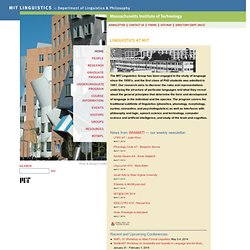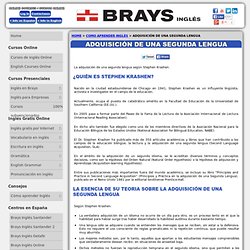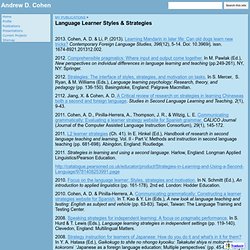

Linguistics home page. The MIT Linguistics Group has been engaged in the study of language since the 1950's, and the first class of PhD students was admitted in 1961.

Our research aims to discover the rules and representations underlying the structure of particular languages and what they reveal about the general principles that determine the form and development of language in the individual and the species. The program covers the traditional subfields of linguistics (phonetics, phonology, morphology, syntax, semantics, and psycholinguistics) as well as interfaces with philosophy and logic, speech science and technology, computer science and artificial intelligence, and study of the brain and cognition.
Adquisicion de una segunda lengua. La adquisición de una segunda lengua según Stephen Krashen.

Nacido en la ciudad estadounidense de Chicago en 1941, Stephen Krashen es un influyente lingüista, activista e investigador en el campo de la educación. Actualmente, ocupa el puesto de catedrático emérito en la Facultad de Educación de la Universidad de Southern California (EE.UU.). En 2005 paso a formar parte del Paseo de la Fama de la Lectura de la Asociación Internacional de Lectura (Internacional Reading Association).
En dicho año también fue elegido como uno de los miembros directivos de la Asociación Nacional para la Educación Bilingüe de los Estados Unidos (National Association for Bilingual Education, NABE). El Dr. En el ámbito de la adquisición de un segundo idioma, se le acreditan diversos términos y conceptos decisivos, como son la Hipótesis del Orden Natural (Natural Order Hypothesis) o la Hipótesis de adquisición y Aprendizaje (Acquisition-learning Hypothesis). Según Stephen Krashen: A Summary of Stephen Krashen's "Principles and Practice in Second Language Acquisition" Age no excuse for failing to learn a new language - life - 22 July 2011 -...
IT'S never too late to learn another language.

Surprisingly, under controlled conditions adults turn out to be better than children at acquiring a new language skill. It is widely believed that children younger than 7 are good at picking up new languages because their brains rewire themselves more easily, and because they use what is called procedural, or implicit, memory to learn - meaning they pick up a new language without giving it conscious thought. Adults are thought to rely on explicit memory, whereby they actively learn the rules of a language. But some linguists now question whether this apparent difference in language-learning ability reflects our attitudes to young children and adults rather than differences in the brain.
"If adults make a mistake we don't correct them because we don't want to insult them," says Sara Ferman of Tel Aviv University, Israel. "The adults were consistently better in everything we measured," says Ferman. More From New Scientist More from the web. What Is It Like to Be Bilingual? Practically everyone has an opinion about the advantages and inconveniences of being bilingual - educators, psychologists, linguists, sociologists - even if they are not bilingual themselves.

With the aid of two short surveys, and many personal testimonies, I propose we let bilinguals tell us what it is like to be bilingual. The dominant picture that emerges is that bilinguals are quite positive about their bilingualism. A first advantage they put forward concerns the ability they have to communicate with different people, of different cultures, in different countries. Linked to this is the fact that being bilingual allows you to read more (if you are literate in several languages naturally) and to sometimes express yourself with greater clarity and with a more diverse vocabulary (when all languages are taken into consideration, of course). A second advantage put forward by bilinguals is the fact that knowing several languages seems to help you learn other languages. References. Glossary of linguistic terms. Lexicon of Linguistics. Basic linguistic notions. Language Learner Styles & Strategies - Andrew D. Cohen. 2013.

Cohen, A. D. & Li, P. (2013). Learning Mandarin in later life: Can old dogs learn new tricks? Contemporary Foreign Language Studies, 396(12), 5-14. Doi: 10.3969/j. issn. 1674-8921.201312.002. 2012. Introduction to Text Linguistics. Introduction to Text Linguistics Robert-Alain de Beaugrande Universidade Federal da Paraíba Wolfgang Dressler Universität Wien Or Digitally reformatted 2002 Contents I Basic notions Textuality.

II. Historical background of text linguistics: rhetoric; stylistics; literary studies; anthropology; tagmemics; sociology; discourse analysis; functional sentence perspective.